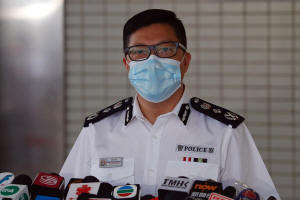Hong Kong security chief steps up pressure on city's main press group
 Send a link to a friend
Send a link to a friend
 [September 15, 2021]
By Sara Cheng [September 15, 2021]
By Sara Cheng
HONG KONG (Reuters) - Hong Kong's security
chief called on Wednesday for the city's main press association to
disclose to the public who its members work for and how many of them are
students, a day after he accused the group of infiltrating schools.
The comments by Secretary for Security Chris Tang are likely to deepen
concern over a crackdown on civil society in the Asian financial hub
after Beijing imposed a sweeping national security law on the former
British colony last year.
Tang, in an interview with the pro-Beijing newspaper Ta Kung Pao
published on Tuesday, said the Hong Kong Journalists' Association (HKJA),
was infiltrating schools to recruit students as journalists.
The HKJA, responding to Tang, did not specifically mention the
infiltration accusation but said that as of Wednesday it had 486 members
and 56 of them were students. It does not disclose who its members work
for.
Tang defended his comments on Wednesday saying he was conveying "doubts
held by many in society" about the press association.

"I believe if they openly let the public know the information, it will
clear their name," Tang told reporters outside the city's Legislative
Council, referring to details about who the HKJA members work for.
The media industry has seen profound changes since Beijing imposed the
security law last year.
Media tycoon Jimmy Lai, a staunch critic of Beijing, is in jail and
awaiting trial on national security charges. His pro-democracy newspaper
Apple Daily closed following police raids and the arrest of executives
including its chief editor.
[to top of second column]
|

Hong Kong's Commissioner of Police Chris Ping-keung Tang attends a
news conference in Hong Kong, China August 27, 2020. REUTERS/Tyrone
Siu

Scores of civic groups and opposition parties have
disbanded or scaled back operations over the past year, while some
of their members have been arrested and jailed.
The Professional Teachers' Union, Hong Kong's largest, disbanded
this month after it was criticised by Chinese state media for "politicising"
education.
The security law, imposed after months of at times violent
pro-democracy protests, punishes what Beijing broadly refers to as
subversion, secession, collusion with foreign forces and terrorism
with up to life in jail.
The Hong Kong government has repeatedly said the law is only aimed
at a tiny group of "troublemakers" and all law enforcement actions
against individuals or groups "have nothing to do with their
political stance or background".
Hong Kong's once-thriving media sector and vibrant civil society
have long been features of the city that returned to Chinese rule in
1997 with a promise of wide-ranging freedoms not guaranteed on the
mainland.
(Reporting By Sara Cheng; Writing by Anne Marie Roantree; Editing by
Robert Birsel)
[© 2021 Thomson Reuters. All rights
reserved.] Copyright 2021 Reuters. All rights reserved. This material may not be published,
broadcast, rewritten or redistributed.
Thompson Reuters is solely responsible for this content.
 |